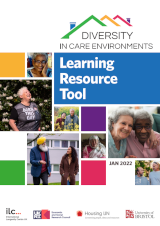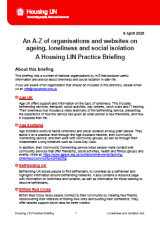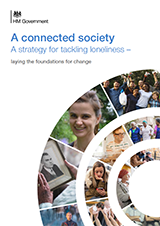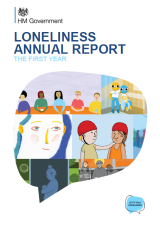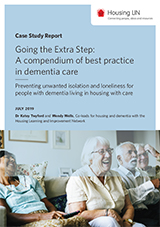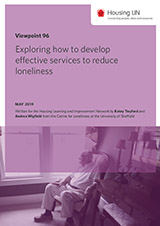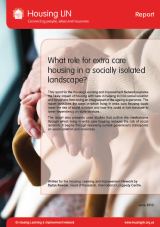Combating loneliness and reducing social isolation
Latest data from the Office for National Statistics from their Community Life Survey (opens new window) reveals that 7% of people (approximately 3.1 million people in England) reported that they felt lonely often or always.
Arranged into 7 key topic areas below, these pages showcase relevant guidance and policy instruments, useful research findings (such as from the DICE research project) and examples of services and innovative projects that offer practical solutions in combatting loneliness and reducing social isolation. The resources listed below deal with the impact that housing and support services can have on responding to these types of need amongst older people
Loneliness and Isolation Key Subjects
Ageing
This section provides a range of resources that make the connection between ageing, loneliness and isolation.
Assistive technology
This section features resources on how assistive technology can help overcome loneliness and isolation.
Care and support
On this page you will find resources relating to the care and support for people experiencing loneliness and isolation.
Dementia
This section highlights the link between dementia and loneliness.
Health and wellbeing
This section contains information on loneliness and isolation and its link with health and wellbeing.
Homes and communities
This page has resources that showcases how home design and the built environment can reduce loneliness and isolation.
Diversity in Care Environments
A study about the social inclusion of older people from socially diverse backgrounds living in housing with care and support schemes.
Key Resources
Diversity in Care Environments (DICE)
Resources based on the findings from the Diversity in Care Environments research study about the social inclusion of older people from socially diverse backgrounds living in housing with care and support schemes.
An A-Z of organisations and websites on ageing, loneliness and social isolation: A Housing LIN Practice Briefing
This Housing LIN Practice Briefing presents a list of organisations and online resources that are aimed to provide information and additional support to those wanting to find out more about, or to access key services, around the issue of loneliness and isolation.
A connected society: A strategy for tackling loneliness
This strategy sets out the approach to tackling loneliness in England. It marks a shift in the way we see and act on loneliness, both within government and in society more broadly.
Loneliness Annual Report: The first year
This Annual Report by the Department for Digital, Culture, Media and Sport provides an update on the progress made against each of the commitments set out in ‘A connected society: a strategy for tackling loneliness’
Going the Extra Step: A compendium of best practice in dementia care
A new Housing LIN publication looking at examples of best practice in dementia care seeking to reduce loneliness and social exclusion for people with dementia.
Exploring how to develop effective services to reduce loneliness
Housing LIN Viewpoint 96 explores best practice in developing effective services to reduce loneliness and provides six top tips for setting up new services.
What role for extra care housing in a socially isolated landscape?
This Housing LIN report highlights five core elements of extra care housing that give older people fulfilling, socially-connected lives.
Consultancy banner
Building on the Housing LIN’s learning and improvement ethos, we offer bespoke advice to help your organisation draw on the lessons highlighted on these pages. To find out how the Housing LIN can support your operational and/or strategic plans, please contact us at consultancy@housinglin.org.uk or visit our consultancy pages.
Latest Resources
- Amar Bari, Amar Jibon: Stories of Bangladeshi ‘Probin’ in London
- Beyond the White Picket Fence: A companion for intergenerational communal housing
- The Connector: An Exploration of Later Life Community Connectedness Through Design Thinking and Co-Design, 2025
- LEMONADE: A practical toolkit for co-producing community-based food models with older adults
- The case for Affordable Rural Housing: People, Policy, and Place
- Loneliness is a public health crisis and neighbourisms should be part of the cure

